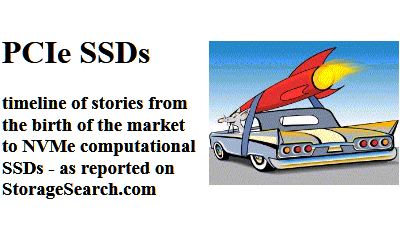|
Dolphin Interconnect is headquartered in Oslo, Norway. U.S. operations are
located in Marlborough, Massachusetts. Dolphin maintains sales offices in
Boston, Los Angeles, Oslo, Germany and France and is represented internationally
by a network of resellers, distributors and integrators. Dolphin has deep
experience in developing leading and innovative computer interconnect
technology. Since the early 1990's the company has been instrumental in the
development of many of the industries most important standards including PCI,
SCI, StarFabric, and PCI Express. Dolphin has supplied its interconnect products
to major industry players including Siemens, Philips, Sony, Lexmark, Sun
MicroSystems, Lexmark, Boeing, and Thales.
see also:-
Dolphin
- editor mentions on StorageSearch.com
- editor's comments:- September 2013 - Starting in
2009 and for a
few years thereafter - Dolphin marketed a range of
rackmount SSDs
which internally used arrays of its own PCIe SSDs - similar in a way to what
Fusion-io does now
in its ioScale - but
different in that Dolphin interconnected their racks using its own pioneering
campus-wide PCIe transparent fabric technologies - rather than
FC SAN.
Dolphin
seems to have backed away from the track of supplying SSD systems - but still
offers rack and cabling technology which supports fast storage systems. The
company says its
express
reflective memory technology (pdf) can multi-cast data across a set of
interface adapters in under 200 nanoseconds.
For current trends in
these markets take a look at the guides for
PCIe SSDs and
rackmount SSDs,
and the article
exciting new
directions in rackmount SSDs
|
|
|
In the early 1990s - when I was
publishing the SPARC Product
Directory - Dolphin (like many other oems at the time - including Sun) used
my publication's services to expand its presence in the SPARC systems market.
Dolphin's high speed remote memory interconnects (which were later called
InfiniBand) were so
good that Sun
bought the technology in 2000.
In March 2009 -
Dolphin launched the
StorExpress a
rackmount SLC
flash SSD with upto 960GB capacity. The
PCIe connected SSD has
R/W throughput upto 2,700MB/s and 50 microsecond access latency. Dolphin quotes
a figure of 270,000 IOPS but the initial datasheet doesn't break out IOPS
figures for reads and writes. The StorExpress can be located upto 10m from the
host bus using copper cable and 300m with optical fibre.
In April 2009 -
MAGMA and
Dolphin jointly
announced
they have collaborated to develop an improved version of the latter's
previously announced 2U StorExpress
PCIe SSD product line,
which will ship next month. Capacity options include 0.5TB (under $20K), 1TB and
2TB. It achieves 270K read and write IOPs (512 bytes to 4KB blocks) and up to
2.8GB/s of sustained bandwidth. Latency is less than 50µS. The StorExpress
enclosure can be positioned 1,000 feet away from the host server using fiber.
In May 2009
- Dolphin's CEO,Tim
Miller shares his
SSD Bookmarks
with readers of
StorageSearch.com.
In
December 2009
- Dolphin announced
that it
intended
to merge with Best
Media AS (an ISP based in Norway - which operates IPTV, IP telephony, internet
and mobile phone services).
|
|

| |
|
|
| . |
|
|
| . |
 |
| ... |
| The idea of using flash as
a new memory tier isn't new. And neither is the idea of using flash in DRAM
memory slots. But in 2014 there were several developments which added weight to
the usefulness of these ideas. |
| 12 key SSD
ideas which changed in 2014 | | |
| . |
 |
| . |
Typically enterprise data
is "trapped" in silos - which relate to the applications or the brands
of storage system the data was born in.
Although it's theoretically
possible to extricate this data for other purposes or to migrate it to storage
which has different characteristics - the processes for doing this are risky and
time consuming - due to interpendencies between applications and the metadata.
As a result - data is less flexible and business opportunities for
data reuse are restricted by the migration costs.
|
| conversations with Primary
Data | | |
| . |
|
| |